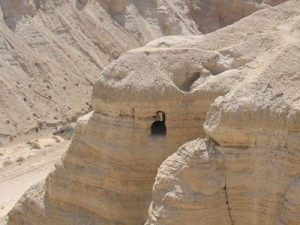by Lois Tverberg
Now go, write it on a tablet before them, and inscribe it on a scroll,
That it may serve in the time to come, as a witness forever. – Isaiah 30:8
Judaism from ancient times until today contains many practices that display great reverence for the written text of the Bible. The centerpiece of every synagogue is the “Torah Ark” – the cabinet that contains handwritten Torah scrolls covered in embroidered cloths, with a silver “crown” decorating each scroll. A silver pointer called a “yad” is used to keep place during the reading to avoid touching the text on the scroll with one’s hands.
The name of God is especially sacred, and never uttered allowed. Any paper that it is written on must not be destroyed, but must respectfully buried in a receptacle called a genizah (gen-nee-ZAH). As a result, all Jewish Torah scrolls and other scriptures are carefully buried and not simply thrown away with other waste, even if they are very warn out and need to be replaced.
 All this extreme care may strike us as excessive. We may wonder how pen marks and paper can be so holy. But interestingly, it is this very practice that preserved the most important copies of the Bible ever found.
All this extreme care may strike us as excessive. We may wonder how pen marks and paper can be so holy. But interestingly, it is this very practice that preserved the most important copies of the Bible ever found.
In the 1940s, many copies of the text of the Hebrew Bible (our Old Testament) were found near the Essene settlement at Qumran, near the Dead Sea. The scrolls had been carefully buried in caves used as “genizahs” around the time of Christ, and were over 1000 years older than the oldest known text of the Bible. Archaeologists were amazed at the fact that the biblical text had been preserved nearly flawlessly over 1000 years.
Though the ancient people did these things simply to revere God’s word, they were actually insuring that people could know its truth and reliability over two millennia later. Their dedication to the Lord even in the way they treated the manuscripts of the Bible had a wonderful outcome that they never could have foreseen. We should also know that what we do to bring honor to God, even if we don’t know why, can be used by God at a time and place later that we never would have dreamed.

